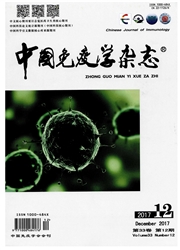

 中文摘要:
中文摘要:
目的探讨IFN-γ/和IL-33在实验性自身免疫性神经炎(EAN)发病机制中的作用及EAN中的Th1/Th2细胞极化。方法用P253-78肽段免疫Lewis大鼠,建立EAN模型,观察其发病情况和组织病理改变,并检测淋巴细胞增值反应,用RT-PCR技术检测干扰素γ(IFN-γ)和白介素33(IL-33)在大鼠发病高峰期脾脏、淋巴结和坐骨神经中的表达。结果EAN组大鼠临床表现明显,病理检查可见大量炎性细胞浸润;坐骨神经组织、淋巴结,脾脏中IFN-γ mRNA表达显著升高,IL-33mRNA表达明显减少,其引流淋巴结淋巴细胞对P253-78aa的刺激发生强烈的淋巴细胞增殖反应。结论IFN-γ对EAN发病起促进作用,IL-33对EAN大鼠起保护作用;EAN中Th0细胞向Th1的转化明显增强而向Th2细胞的转化则受到抵制。
 英文摘要:
英文摘要:
Objective To explore the roles of the IFN-γ,IL-33 and the Th1/Th2 cell polarization in ex perimental autoimmune neuritis (EAN). Methods EAN were induced in Lewis rats by immunization with P253-78aa. The clinical signs of rats and the pathological changes were observed. The lymphocyte proliferation responses of the cells in lymph node were assayed. The expression of IFN-γ and IL-33 mRNA in spleen,lymph node and sciatic nerves were detected by RT-PCR. Results The clinical manifestations were obvious in EAN group which were characterized with lots of inflammatory cell infiltration and stronger lymphocyte proliferation response. The expression of IFN-γ mRNA increased significantly in spleen, lymph node and sciatic nerves while IL-33 mRNA decreased obviously in ENA group. Conclusions The expession of IFN-γ mRNA was probably correlated with the severity of EAN whereas the secretion of IL-33 may inhibit the onset and development of EAN. In EAN the conversion from Th0 cell to Th1 cell was increased, whereas the conversion from Th0 cell to Th2 cell was suppressed.
 同期刊论文项目
同期刊论文项目
 同项目期刊论文
同项目期刊论文
 期刊信息
期刊信息
